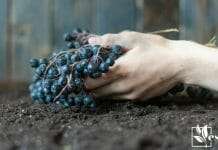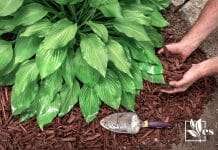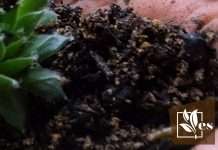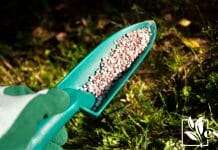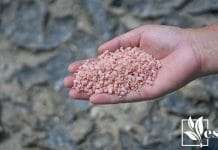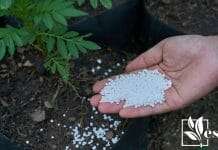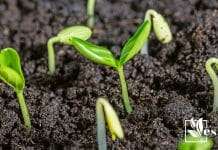- Do Deer Eat Sunflowers: Protecting Your Garden Blooms from Wildlife - March 27, 2024
- How Often to Water Cucumber Plants: Essential Watering Frequency Guide - March 26, 2024
- How Often Do Strawberries Need to Be Watered: Essential Irrigation Tips - March 26, 2024
Composting is a vital process for converting organic waste into a powerful soil amendment that can enhance the productivity and health of gardens and agricultural lands. As an experienced gardener, I’ve consistently relied on the natural nutrients found in cow manure to enrich the soil in my garden. It’s teeming with beneficial microorganisms that help break down plant material, releasing nutrients that plants can absorb and use.
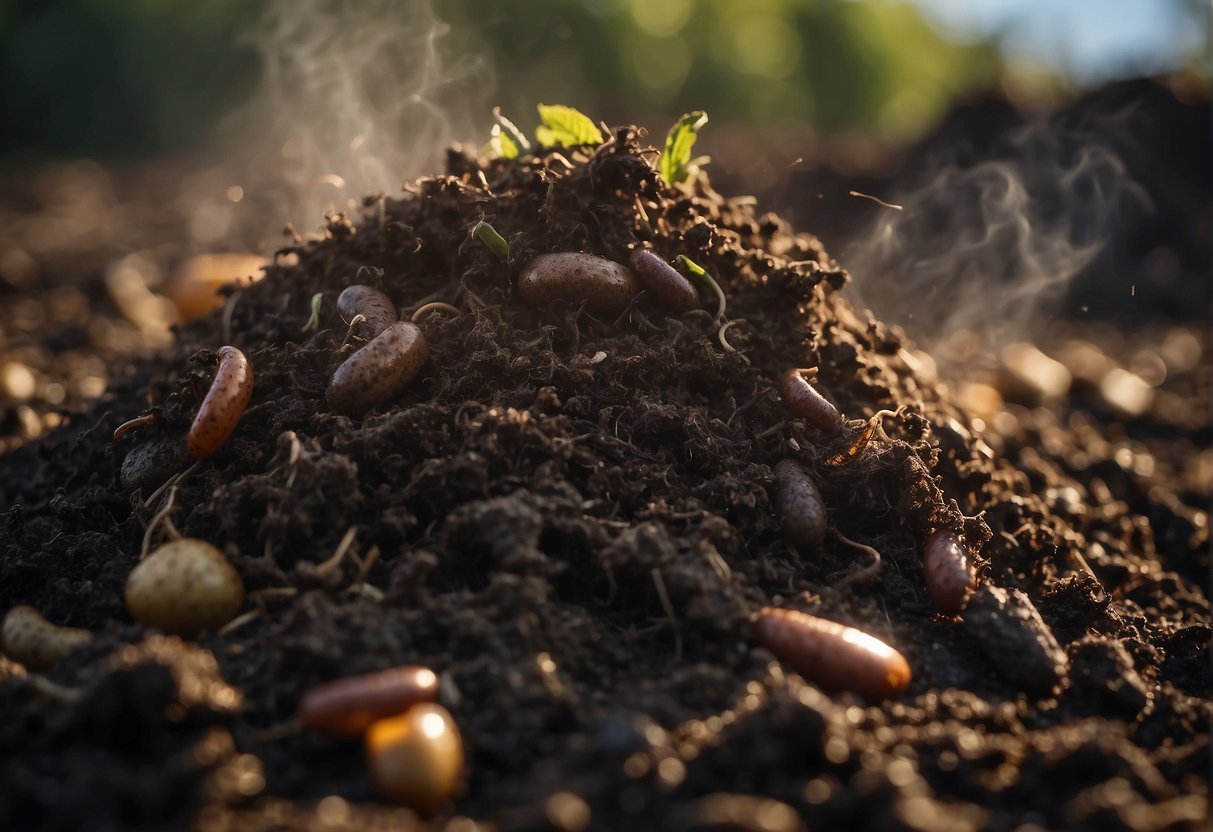
The timeframe for composting cow manure varies, but under optimal conditions, it typically takes about three months for cow manure to transform into compost. Key factors influencing the process include the size of the compost pile, moisture levels, the carbon-to-nitrogen ratio, aeration, and ambient temperature. Adequate management of these factors ensures a quicker and more efficient composting process.
A well-managed compost pile can reach temperatures of up to 130°F, which helps to accelerate the breakdown of organic matter. This heat also destroys weed seeds and pathogens, making the resulting compost safer for use. By integrating proper techniques and routine maintenance, such as regular turning to introduce oxygen, cow manure compost can be utilized in the garden to promote robust plant growth and improve soil structure.
JUMP TO TOPIC
Composting Cow Manure for Garden Enrichment
Integrating cow manure compost into your garden significantly boosts soil health, enhancing plant growth. I’ll discuss its benefits, the composting process, and safety measures to optimize your compost’s efficacy.
Understanding Cow Manure as a Compost Material
Cow manure is a valuable organic compost material, rich in nutrients like nitrogen, which plants need for growth. The nitrogen content in cow manure compost contributes to soil fertility and structure when properly composted. To transform raw cow manure into beneficial compost, I rely on a critical balance of moisture, oxygen, carbon, and nitrogen to encourage microbial activity. This leads to a decomposed and odor-free product that significantly enriches the soil.
The Process of Composting Cow Manure
💥 How long does it take for cow manure to compost?
The complete composting process for cow manure typically takes 3 months but can vary based on composting conditions.
The actual duration depends on factors like pile size, the mix of carbon-rich materials (like straw or leaves), and how often the pile is turned to introduce oxygen. A hot composting method is effective for quicker results, where the internal temperature of the pile should reach around 130°F to kill pathogens.
How to Compost Cow Manure Safely
Composting cow manure safely is paramount to prevent the potential spread of pathogens. I ensure the compost reaches the right temperature and sustain it for a suitable period. The process involves:
- Layering: Alternating layers of cow manure with carbon-rich materials
- Aeration: Turning the pile regularly for oxygen flow
- Moisture: Keeping the pile as wet as a wrung-out sponge
- Temperature Monitoring: Ensuring prolonged temperatures of at least 130°F to kill off pathogens
To ensure the compost is safe for garden use, it should mature fully before application, avoiding the risk of harming plant roots or transmitting disease.
Improving Soil Fertility and Plant Growth
Transforming cow manure into compost is a reliable method to enrich soil with essential nutrients required for flourishing plant life.
Benefits of Nutrient-Rich Compost on Plant Health
I’ve found that incorporating composted cow manure significantly enhances the nutrient profile of garden soil. Here’s how:
The nutrient content in composted manure is a balanced combination of nitrogen (N), phosphorus (P), and potassium (K) – commonly referred to as NPK, which are critical for plant development.
Optimizing Nutrient Uptake in the Garden
It is important to ensure that plants can access and utilize these nutrients. Therefore, I take the following steps:
- Ensure even mixing of compost into the soil to improve nutrient distribution.
- Monitor soil pH levels, aiming for a neutral range, as extreme pH can lock out nutrients, making them unavailable to plants.
These nutrients, especially nitrogen, are vital for foliage development, while phosphorus and potassium are essential for root and fruit growth, respectively. An even distribution of nutrients and a favorable pH level maximize plants’ capacity to absorb these life-supporting elements.
Best Practices in Cow Manure Composting
When composting cow manure, I ensure I apply effective strategies to optimize the process and produce valuable fertilizer for gardens. Here’s a breakdown of essential best practices:
Maintaining the Right Moisture and Temperature
In my compost pile, maintaining an ideal balance of moisture and temperature is crucial for successful decomposition. I aim for a consistent moisture level akin to a wrung-out sponge. If the pile is too dry, microbial activity slows, while excess moisture leads to anaerobic conditions, which can cause odors.
I carefully monitor the temperature of my compost pile to ensure it reaches between 130°F and 150°F, which is effective for killing pathogens and weed seeds.
Aeration and Turning for Effective Decomposition
Aeration is another critical factor I pay attention to. By regularly turning the compost pile, I introduce oxygen that feeds aerobic bacteria, which speeds up the breakdown of manure.
Controlling Odors and Pathogens in the Compost Pile
Controlling odors and pathogens is essential for a healthy composting environment. I achieve this by creating a proper balance of green (nitrogen-rich) and brown (carbon-rich) materials in my pile and maintaining high temperatures that eradicate pathogens.
To prevent attracting pests or creating foul smells, I never add meat, bones, or fatty materials to my compost pile.
Environmental Impact and Sustainable Methods
In evaluating the environmental influence of cow manure composting, the concentration rests on reducing emissions and promoting sustainable agricultural practices. Let’s explore how composting cattle waste effectively curtails greenhouse gas emissions and the integration of manure into eco-friendly systems.
Reducing Greenhouse Gas Emissions through Proper Composting
When composting cow manure, I’m acutely aware that proper techniques can significantly lower the release of methane—a potent greenhouse gas. By fostering the right conditions for aerobic bacteria to thrive, I help convert organic matter into compost without producing excessive methane that would otherwise escalate global warming. Responsible compost management, including regular turning and maintaining appropriate moisture levels, also reduces carbon dioxide emissions, another contributor to greenhouse gases.
Proper aeration during composting minimizes methane production, making it an eco-friendly practice.
Alternative Uses for Cow Manure in Eco-Friendly Practices
My pursuit of sustainable methods extends beyond composting. I explore alternative uses like incorporating cow manure into biogas production, which seizes methane for energy rather than letting it escape into the atmosphere. This not only supplies renewable energy but also produces a nutrient-rich digestate perfect for soil amendment. Moreover, by diverting manure to biogas systems, I’m mitigating the overuse of synthetic fertilizers, thus contributing to a more sustainable farming paradigm.
💥 Eco-Friendly Tip: Utilize cow manure in biogas generators to convert harmful gases into renewable energy.
I am committed to my role in steering agriculture toward a future where sustainability is not just an aspiration but a reality, considering both small-scale and widespread impacts on our planet’s wellbeing. Engaging in these eco-friendly practices makes me part of an essential movement towards reducing our environmental footprint.


